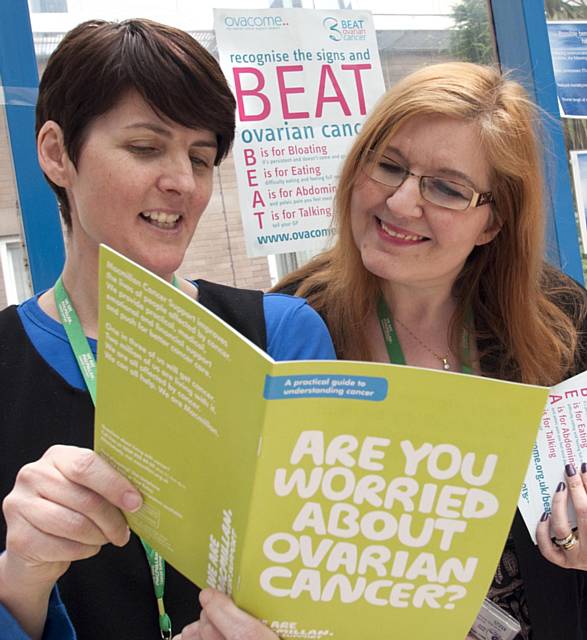Ovarian cancer month
Date published: 04 March 2013

Gynaecology Nurse Specialists Amanda Storey and Julie Dale
The symptoms of ovarian cancer are being highlighted by a team of Gynaecology Macmillan Nurse Specialists at The Pennine Acute Hospitals NHS Trust as part of a national annual awareness raising drive.
More than 7000 women in the UK are diagnosed with ovarian cancer every year; around 19 women every day. It is most common in women over 50; more than 8 in 10 new cases are diagnosed in women aged 50 and over but it can affect all ages.
March is Ovarian Cancer Awareness Month. As part of the campaign, a team of Gynaecology Macmillan Nurse Specialists at the Trust are encouraging women to go to their local GP (family doctor) if they notice any regular, persistent symptoms that may be associated with the disease.
During March Macmillan Gynaecology Nurse Specialists Julie Dale, Jean Sellars and Amanda Storey will be holding information events and poster displays at the Trust’s four hospitals at Oldham, Bury, Rochdale and North Manchester promoting the signs and symptoms of ovarian cancer and giving advice on where people can seek more information and help.
The team will also be working jointly with Macmillan’s partners at Manchester Fort and Oldham Elkmill retail parks on Monday 11 March where they will be handing out information and goody bags.
Symptoms of ovarian cancer can include new, frequent and persistent pelvic and abdominal pain, swelling of the abdomen and bloating, difficulty eating and feeling full quickly, and urinary symptoms (needing to wee more urgently or often than usual).
Developing cancer because of an inherited faulty gene is quite rare - only between 5% and 10% of cancers (less than ten out of 100 cases) are thought to be clearly linked to an inherited faulty gene. Women should also alert their doctor if there are two or more cases of ovarian or breast cancer in their family as ovarian cancer can sometimes run in families.
Julie Dale, Gynaecology Macmillan clinical nurse specialist based at North Manchester General Hospital, said: “It is important that if you develop any of these symptoms and they occur on a regular basis, to get them checked by your doctor. We would support women whose symptoms continue after seeing their GP, to return for more advice. Do remember that many of these symptoms are common to other conditions so experiencing them does not mean that you have cancer. However, if they persist then it is important that they are checked appropriately. The earlier any cancer is diagnosed, the greater chance there is of survival.”
Survival from ovarian cancer has almost doubled over the last 30 years; over 1000 more women per year in England and Wales are now surviving ovarian cancer for at least five years. Women with early stage ovarian cancer have survival rates in excess of 70%.
Women who are worried that they may have an increased risk of developing ovarian cancer because of cancer in their family can be referred to a genetic counselling clinic. Women are advised to speak to their local GP, or they can self refer to Oldham Cancer Family history clinic by calling 0161 909 8537.
Do you have a story for us?
Let us know by emailing news@rochdaleonline.co.uk
All contact will be treated in confidence.
Most Viewed News Stories
- 1Abandoned shopping centre to be brought back to life as a banqueting hall
- 2Rochdale Sixth Form College hits new high with twelve Oxbridge offers for students
- 3Record number of norovirus patients in hospital
- 4Rejection of plan for SEN school being appealed
- 5Appeal after man arrested on suspicion of multiple harassment incidents in Rochdale
To contact the Rochdale Online news desk, email news@rochdaleonline.co.uk or visit our news submission page.
To get the latest news on your desktop or mobile, follow Rochdale Online on Twitter and Facebook.

